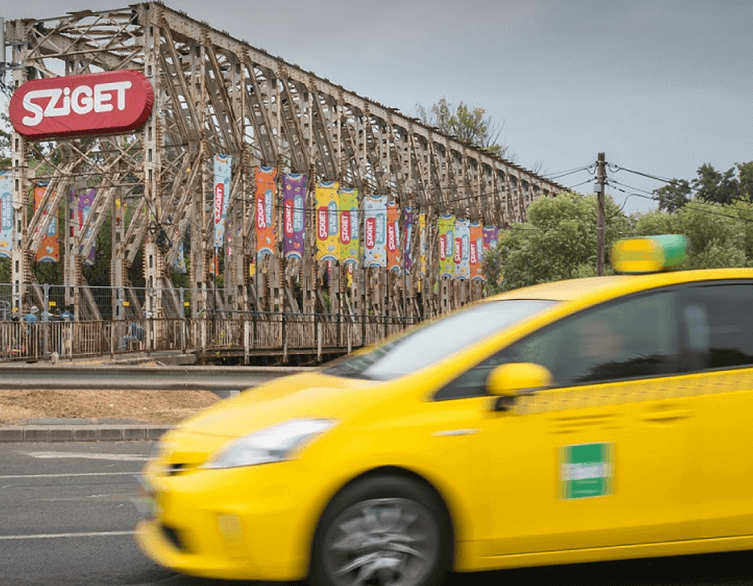Budapest Taxi Crackdown During Sziget Festival 2025

If you were planning to visit Budapest for the legendary Sziget Festival this August, you probably relied on taxis to get around the city. What you might not have realized is that behind the scenes, authorities were conducting one of the most comprehensive taxi enforcement operations in the city’s recent history. The results were eye-opening, and as a tourist, understanding what happened can help you navigate Budapest’s transportation landscape more safely in the future.
A Week-Long Investigation Reveals Shocking Practices
During the eight days of Sziget Festival 2025, Budapest’s transportation authority (BKK) partnered with multiple agencies to conduct an unprecedented crackdown on taxi services. The scope was impressive – nearly 400 inspections took place not just around the festival grounds, but throughout the entire city. What they discovered paints a concerning picture of the taxi industry that directly affects visitors like you.
The numbers tell a stark story. Out of those 400 inspections, authorities had to file official reports in 164 cases. Even more troubling, 89 of those cases involved serious violations that put passengers at risk and emptied their wallets unfairly. The violations ranged from drivers operating without proper licenses to charging astronomical fees that would make your vacation budget disappear faster than a Hungarian summer.
The Most Outrageous Case: A 60,000 Forint Ride
Perhaps the most shocking discovery was a driver who attempted to charge tourists 60,000 forints for a ride from Nyugati Railway Station to Sziget Festival. To put this in perspective, this amount is more than twelve times the legal fare for that journey. The driver was promptly arrested on suspicion of fraud, but imagine if you had been the unsuspecting tourist who agreed to that price, thinking it was normal for festival season.
Best deals of Budapest
This wasn’t an isolated incident. Inspectors regularly encountered drivers who set fixed prices upfront, completely bypassing the required taximeter system. Some refused to take passengers to their requested destinations, instead driving them elsewhere. Others operated with expired licenses – in one case, a driver had been working with documentation that expired more than eighteen months ago.
The Technology Behind Illegal Operations
What’s particularly concerning for tech-savvy travelers is how some illegal operators exploited modern communication methods. Authorities uncovered operations running through various mobile applications, using ordinary civilian vehicles to transport passengers without any permits or insurance coverage. In one case, they discovered an illegal taxi service operating through a Viber group chat, where unsuspecting passengers could book rides through what appeared to be a legitimate service.
These app-based illegal services pose a particular risk to tourists who might assume any ride-hailing service operates legally. When authorities caught these operators, the consequences were severe – license plates were confiscated, vehicles were removed from circulation, and legal proceedings were initiated against both drivers and vehicle owners.
The Enforcement Response
The crackdown involved an impressive coalition of agencies working together. Beyond the BKK transport inspectors, the operation included the Budapest Police Headquarters, the Transport Authority, local district supervisors, tax authorities, consumer protection agencies, and even workplace safety inspectors. This multi-agency approach ensured that violators couldn’t slip through regulatory gaps.
The enforcement teams worked in two shifts throughout the festival period, from setup to breakdown. They didn’t just rely on random stops – they used undercover operations with test customers to catch violations in real-time. When they found drivers taking passengers to wrong destinations or charging illegal fares, police officers would escort the vehicles to inspection points for thorough examination.
What This Means for Future Visitors
The common violations discovered during these inspections reveal what you should watch out for when taking taxis in Budapest. The most frequent problems included drivers who refused to provide receipts, vehicles missing required identification elements like fare charts or taxi stand permits, and most importantly, drivers who quoted fixed prices instead of using the meter.
Budapest authorities have made it clear that this level of enforcement will continue. The city recognizes that both honest taxi drivers and passengers benefit when fraudulent operators are removed from the market. This ongoing commitment to clean up the taxi industry should ultimately result in safer, more reliable transportation for tourists.
Protecting Yourself as a Tourist
Understanding these enforcement efforts helps you make better transportation decisions during your Budapest visit. Always insist on the taximeter being used rather than accepting quoted prices. Ensure your driver provides a receipt, and don’t hesitate to ask to see proper licensing if something feels wrong. The legitimate taxi operators welcome this scrutiny because it protects their honest business practices.
The Sziget Festival enforcement operation demonstrates that Budapest takes tourist safety and fair pricing seriously. While it’s unfortunate that such extensive enforcement was necessary, the results show the city’s commitment to providing visitors with trustworthy transportation options.
Looking Forward
The success of this operation – removing illegal operators and prosecuting fraudulent drivers – sends a strong message to the taxi industry. Budapest’s authorities have shown they’re willing to deploy significant resources to protect both residents and visitors from transportation scams.
For future festival-goers and Budapest tourists, this crackdown represents positive change. The city is actively working to ensure that your transportation experience matches the high standards you expect from one of Europe’s most beloved destinations. The partnership between various agencies also suggests that this comprehensive approach to transportation enforcement is here to stay, making Budapest a safer and more transparent city for everyone who visits.
The message is clear: Budapest values its visitors too much to let dishonest operators tarnish the city’s reputation. The extensive enforcement during Sziget Festival 2025 was just the beginning of a broader commitment to transportation integrity that will benefit every tourist who chooses Budapest as their destination.
Related news













